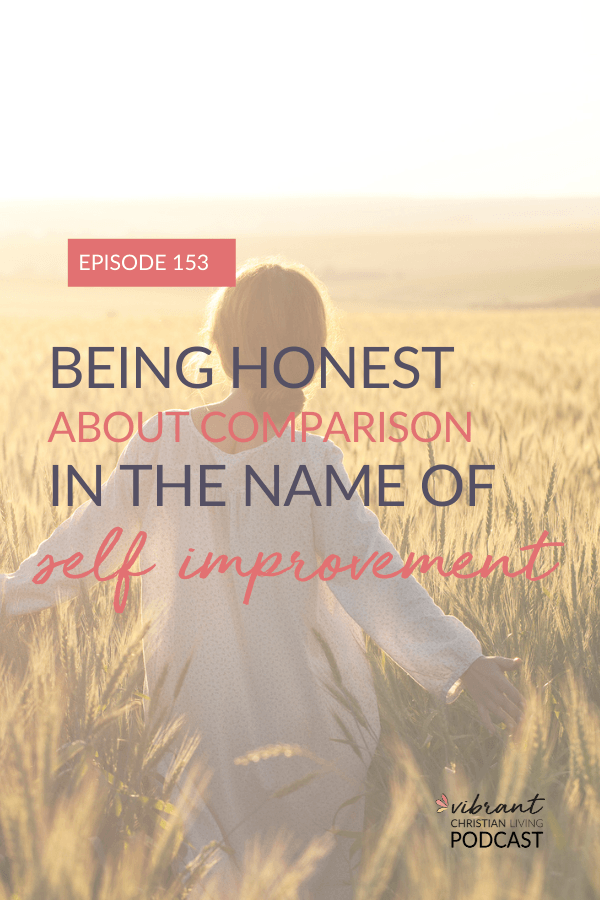Ever found yourself unintentionally stuck in the comparison trap? As we seek self-improvement and look to make our lives better we can easily fall into the comparison trap. We know that comparison is an incredibly destructive mindset, but how can we manage our thoughts in a way that doesn’t use comparison as a motivation for self-improvement?
WHAT YOU'LL LEARN:
-
- [3:27] Why do we get stuck in the comparison trap?
- [5:33] Comparison is natural but unhelpful
- [7:14] Finding freedom from other people’s definitions of “better”
- [10:31] Recognizing our comparison triggers
- [16:59] Making our expectations align with God’s truth
- [23:13] Growing with compassion through the process of dealing with comparison
- [29:38] Freedom from comparison and competition through humility
- [31:48] Contentment and security in our identity in Christ
- [38:07] TODAY’S LISTENER SUBMITTED QUESTION: How should I work on mindset with my children?
[3:27] Why do we get stuck in the comparison trap?
We all compare ourselves to others. Deep down, Heather thinks we want to know if we’re acceptable. We want to know how we’re doing and comparing ourselves to others is how we have been conditioned to find out this information. We get grades in school, and we get performance evaluations at work. There are tangible ways to measure ourselves in those arenas. In several other arenas, however, we don’t have these tangible measurements. Our brain fills in the gaps in an effort to keep us safe.
[5:33] Comparison is natural but unhelpful
While this comparison is a natural and biological process, there comes a point where it is no longer helpful. As Heather says, “Comparison’s ladder has no top rung.” Most of us are comparing ourselves to someone else, and we internalize the idea that we want to make ourselves better. We may want to be healthier, or we may want to have a beautiful home, or we may want a better marriage.
Striving for these things is fine, but when they are done in the context of comparison then there is no end. We could get our house to look like it belongs on HGTV, only to have someone down the street do something better. In ten years, all those “perfect” houses are going to be totally outdated, and then what? We always feel like we have to keep up, and it’s a comparison trap. There is never any landing point.
Jesus died so we could live free and rest. When we are chasing “better” and stuck in comparison, that rest really eludes us.
[7:14] Finding freedom from other people’s definitions of “better”
Justifying comparison in the name of self-improvement is toxic for us because we start to feel like we can never get there. We are not content with how things are now. We also have to consider whose definition of “better” we are using. Heather shares that creating vision boards has become very popular, and she encourages us to consider what Jesus would say about our vision board. Is His definition of a “better life” for us to have perfect homes and perfectly shaped bodies? What if, instead, we worked toward looking like Jesus or loving others better?
Heather pushes back on the idea of “chasing better” because we should focus less on our own pursuit and more on Jesus working through us and enabling us to do hard and miraculous things, like loving other people. Jesus is not working through us to get a more beautiful house.
It is, of course, all about context. It’s not bad to redo your house, but when these things become what our contentment hinges upon, or what we look to for satisfaction, or what we believe will save us, then we are stuck in the comparison trap.
A lot of the work Heather does focuses on body image, and she feels like deep down her quest for a better body was really a quest for salvation. She thought having a better body would make her more loved, accepted, valuable, and satisfied. When she was experiencing her eating disorder and exercising constantly, she wouldn’t have said it was a quest for salvation. Looking back on it now, however, she sees that what she really craved was to know that she was okay and that she was worthy. Really, the only person that can answer that question adequately is Jesus, through what He did on the cross. When we try to fill this need and find substitutes for feeling worthy, that is when it starts to get messy.
[10:31] Recognizing our comparison triggers
There is nothing wrong with self-improvement, and there is certainly nothing wrong with a holy desire to grow closer to God and to be more godly. When our identity, however, hinges on needing to be better, that is when the red flags come up.
Heather uses body image as an example because it applies for a lot of women, especially as we see all of the beginning of the year weight loss commercials, and all the people on Instagram encouraging us to sign up for their plans so we can look better in the new year. Heather admits to being tempted by these things, because the trick her mind can play is that if she could just get that body then she would be happy. She has to force herself to be aware of that lie that she falls for every time.
This process of bringing our comparison triggers into our awareness starts with watching our mind walk down that road. When we start thinking we should try a diet plan, for example, we can watch and consider what we think is promised to us on that path. If we go down that path, we think we will feel so great and reach that joy and freedom we want. Heather also points out that rest is often the ultimate promise of all the things we chase. We can say we want joy, peace, happiness, and satisfaction, but ultimately she believes we are motivated by rest. We want rest from the painful feelings of not being worthy or not being enough.
You never go on a diet, for example, with the intention of being on a diet for the rest of your life. You hope at some point it will end. You will have lost weight and then you can eat normally again. That is the temptation, and we need to be aware of “get rich quick” schemes that aren’t just about money. In addition, we have to know what is a comparison trigger for us personally. Heather says that while she is not tempted by money, but if you tell her that she can get skinny, then she has to battle comparison.
Once you find that biggest area of comparison for you, you are really identifying an idol in your life. For Heather, it was her body image idol. For some, it could be an idol of success. Maybe we believe our home is the status symbol of success in this life, and success is that idol that we are trying to serve thinking that it will make us feel satisfied, happy, fulfilled, loved, peaceful, and rested. As soon as we reach a certain level of success, we can sigh in relief. We know, though, that it never really works that way. We have to start from a place of noticing and being aware without immediately jumping into judgment and anger.
[16:59] Making our expectations align with God’s truth
Often we compare our circumstances to others’ when ours are not meeting our own expectations. Expectations are demonized wildly, but Heather thinks we have to go deeper than that. It is impossible to get rid of all expectations in life, especially if you are a planner or a goal setter. Heather believes there is a process that God has to do in our hearts so that our expectations align with His truth.
In marriage, for example, it is a wonderful expectation to marry a man that would never be tempted to look at any other woman. In reality, we have to marry a human. We don’t have the option of marrying Jesus, and we have to marry a human man who may let us down on that expectation at some point in time.
Heather frequently counsels women on the idea that it is okay to grieve the loss of that expectation. It was a good expectation that our heart had, but we have to move on and recognize that we are in a marriage that is going to sanctify us. We will learn about this hard, sinful, and broken world through marriage. God can help us to love our spouse and to love like He loves. So expectations are not bad, but we have to align them with God’s truth.
Another aspect of expectations is that sometimes we can hear that lie of the enemy, that God has cheated us. We might wonder why a sister has a better relationship with our mother than us, or why a friend has a better marriage. feels like God cheated us. The truth, however, is that life isn’t fair but we have so much acceptance through His grace.
If we really understand grace, we can understand our identity. We can also understand sanctification, which is God’s betterment process. Understanding God’s grace allows us to understand that He has a specific purpose for our lives and that He has given us everything we need to accomplish His purpose for our lives. When we look at other people and say it isn’t fair that we don’t have this or that, we are disregarding God’s grace and completely dismissing the path that He wants me to be on. This is an uncomfortable thing to acknowledge, but we may feel at times that we know better than God. We feel like our lives would be better if we were a different size, lived in a different part of the country, had a different job, had different parents, or whatever else. When we think that way, we disregard God’s grace. We disregard His passion and purpose for us and for the life that he wants us to live.
[23:13] Growing with compassion through the process of dealing with comparison
We can, at times, be quick to judge ourselves for engaging in comparison. We have to commit to noticing and staying vigilant about it, but in addition we have to cultivate that loving, kind acceptance and compassion for ourselves as we grow through this process. It all goes back to grace, because on the days when Heather recognizes that she is chasing the perfect body, she has to reconcile that. She may notice that she is avoiding eating, or telling herself that she ate too much the day before. She deprives herself of food thinking that it will make her thinner, serve her body image idol, and make her life better. When that happens, she has two choices. She can shame herself, or she can engage in what her pastor calls “the dance of walking in the Spirit”.
The spiritual walk is not a straight line. Maybe we wake up in the morning walking straight, and then by breakfast we have already yelled at our kids and our husband and we aren’t walking straight anymore. We’re off the beaten path. Heather’s pastor references this as the “dance” of walking back and getting back into the Spirit. Thanking God for His grace leads us to repentance.
No one has ever shamed themselves into better behavior. It is God’s kindness that leads us to repentance, and so Heather chooses to think about His love and kindness instead. She thanks God for His time and for helping her to think about herself the way He does. She decides that if she falls again, she can have the same conversation with God without lingering in shame. We can distinguish between the voice of condemnation and conviction. Conviction is from the Holy Spirit, but it always has a tone of grace and compassion. At the heart of it, we are encouraged to turn back toward God. Condemnation just makes us feel bad. There is absolutely no hope in it. Learning to tell the difference between those two messages we hear in our heads has been a process for Heather, but she believes it is an important one.
As Heather points out, we all know the cliche that “Comparison is the thief of joy.” Despite that, though, we find ourselves scrolling Instagram and comparing. It doesn’t do anything to change us. Knowing God’s grace, however, has a power unlike any cliche. When we are scrolling Instagram and comparing, we can recognize that God has given us so much grace. He doesn’t want us to be like the people we see on our screens. We can find freedom from the comparison trap because we can step outside of thinking about being better. There is no way to enter into these comparison games and win if we are just applying cliche to the problem. With comparison, we have to have meatier answers from the Bible.
[29:38] Freedom from comparison and competition through humility
We are told in Micah 6:8 to walk humbly with our God. All throughout scripture and the Beatitudes, humility is emphasized over and over again. Heather shares a nugget of gold for those of us who compare in the Colossians 3 message paraphrase. It says, “Be content with second place.” That solves comparison right there. When we compare, we enter into this imaginary contest and the other person is ahead. Sometimes we may enter into this imaginary contest and we are ahead, and that becomes pride. When we can be content with where we are without feeling like we don’t measure up, we can be free from trying to compete and win.
[31:48] Contentment and security in our identity in Christ instead of comparison
This again goes back to identity. If we are secure and solid in our identity in Christ, nothing can take it from us and it can’t be added to. We can recognize that God cannot love us any more or any less than what He does right now. We don’t have to do anything to make Him love us more, and there is nothing we can do to become more precious to Him. We are enough right now.
What if we walked into a room and thought about how we could serve others? What if we actively sought to be second? That is how Christ entered the room. He sought to serve and love others.
Heather uses an illustration of our parents being multi-millionaires and us knowing that as soon as they passed away we would inherit all of their money. Right now we might feel financially insecure, but we knew someday we would inherit millions. We probably wouldn’t feel overwhelmingly depressed, discouraged, and hopeless about our current impoverished state. We could be content, because we would know that someday our millions are coming. We can have hope for the days when we can eat what we want and buy the things we don’t currently have.
This is the same kind of hope we can have in Christ. We may put our future hope in shallow places, like losing weight, getting organized, improving our marriage, or getting our kids to behave. When we put our hope in those things, we can be disappointed. We might improve something just to see another area of our lives falling apart. We can never get all the ducks in a row to stop quacking. If we could live as if we have a future hope and really understand our solid identities, that would make the difference. It doesn’t matter what other people think, because the king of kings, the lord of lords, and the creator of the universe – says I am accepted through His son. Being able to have that kingdom perspective every day gives us so much freedom, so much hope, and so much more of a settled identity as we walk through life.
In Psalms, David affirms over and over how much God loves him and takes care of him. Our hearts are created to worship, and every day we have a choice of what to worship. We can be tempted by a lot of things in our culture – hot bodies, beautiful homes, success, relationships, parenting, and so much more. Soaking in God’s love and turning it back toward Him in worship, however, is what truly gives us freedom from comparison.
[38:07] TODAY’S LISTENER SUBMITTED QUESTION: How should I work on mindset with my children?
Today’s question actually came from inside the Christian Mindset Makeover group. The Christian Mindset Makeover is a program that I run that has grown out of my coaching practice. It takes place over a nine-week period to help women understand the root soundtracks they are hearing for that result in things like comparison or perfectionism, or feeling enough. We help them walk on a journey to understand why they are there, what they need to let go of, and what they need to take accountability for. We teach them how to use brain science to rewire their thoughts from the inside out, remove the negative thought patterns on a deep, subconscious level, and rewire them with God’s truth. It is an extremely powerful program, and I would love for you to check out the Christian Mindset Makeover.
Question:
As I’m going through the coursework, I can’t help but think how I want to teach my girls this while they’re young. One is eight, and she is struggling with a lot of anxiety and just very active thoughts. Any thoughts on how to start simply sharing this with kids? What is appropriate; what is not? Or, what is just overwhelming?
Answer:
As we find this freedom, we want to be able to help our children so they don’t have to deal with the same issues. I too am going through the stage of the tender years with our emotions, so to speak. I have three teens of my own who are 19, 15, and 14, and I also have a 10-year-old. So we are right in the midst of teaching them how to manage their emotions in a helpful way. So, here is what I said to Valerie and what I would say to anyone asking this question.
I think it’s really important for them to understand these principles from an early age. I can’t necessarily say how to share about it with every individual child, but I can share how we talk about it in our house. I try to focus on three things first, helping them notice what they are thinking and feeling. I think a huge part of anyone’s journey is noticing their negative thoughts and considering what those are about. We need to notice it from an objective and kind point of view, without condemning ourselves. We can help our children learn to notice, because so often we don’t even realize what is going on.
With my kids, I try to teach them what is triggering those thoughts when they feel like they are spiraling in anxiety. We think about what the causes are, and we don’t run away from it. Then I try to help them see that it makes sense that they are upset. Acknowledging what they are feeling is real and reasonable is important. They can learn to understand that it isn’t bad for them to have emotions or feelings – one of the worst things we can do is tell our kids to buck up and deal with it and to invalidate the fact that they have feelings. It is so important that we help them to recognize their feelings are real and there is a reason for them. We don’t want them to let their feelings take over their whole life, but they are allowed to have a space at the table and there is a reason for those feelings to be there.
The third thing I would say is that I try to help them when they are going through those processes when they are really struggling with those emotions because we need to focus on them. We need to be able to see them. We try to encourage them to find healthy ways to find comfort, especially things that will point them back to Christ and help them focus on their unshakeable identity in Christ. We can teach them to self-soothe, just as we had to when they were babies. We can teach our kids that feelings aren’t bad, they have a good reason for them, and they can manage them in healthy ways.
Our bodies are designed to find a relief valve, so while our children are still in our homes we can guide them toward healthy coping strategies. We can experiment with different ways to find some relief and relieve some stress.
So those are the three things I would focus on: helping them notice what they are feeling and what is triggering those thoughts, helping them see that their feelings make sense in context, and helping them find ways for healthy comfort that point them back to Christ.
If you have any questions you want me to talk through on the podcast, you can connect with me on Instagram and send me a DM. If this episode was encouraging for you or if you know someone struggling with comparison, I would love for you to share the episode with others.
CONNECT WITH HEATHER CREEKMORE:
OTHER PODCAST EPISODES ON FINDING FREEDOM FROM THE COMPARISON TRAP:
- Episode 38: How to Live in Your True Worth + Identity in Christ
- Episode 66: Identity Pt 2: Set Yourself Free + Discover Your God-Given Identity with Octavia Louis
- Episode 81: Releasing Perfectionism + Becoming Enough with Mazi Robinson
- Episode 112: How to Find Your Beauty and Worth in God with Bethany Beal + My 13 Year Old Daughter Susie
- Episode 123: Overcoming Body Image Issues with Rachael Gilbert
- Episode 127: Mindset Coaching: “How can I stop thinking I’m not good enough?” with Heidi
FREE WORKSHOP: Learn How to Transform Your Thoughts to Transform Your Life
Do you find it hard to let go of worry? Struggle with feeling you’re never enough?
Or maybe you’re frustrated because you can’t make the changes you want in your life (lose the weight, start new habits or grow in a certain area)?
Both brain science AND scripture show that every action we take starts first with a thought. If we change our thoughts, we can change our results.
That’s why I want to give you the inside scoop on the most effective ways to change our thoughts at this FREE WORKSHOP!
Sign up now at VibrantChristianLiving.com/mind

At this FREE WORKSHOP you’ll learn:
- Why it makes sense you’re stuck in toxic thought patterns
- The truth behind 3 popular myths on how to overcome negative thoughts
- A simple 3-step strategy to manage negative thoughts in-the-moment (this powerful tool alone is worth coming!)
Plus you’ll get an inside look at the Christian Mindset Makeover™–the only course that equips Christian women with powerful brain-science + biblically based tools to break free from negative thoughts—in only 9 weeks!
Go now to VibrantChristianLiving.com/mind right now to sign up for this amazing FREE WORKSHOP to learn how to transform your thoughts to transform your life.


